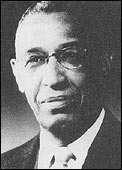Historic Moments: The Honorable George Neves Leighton

Oftentimes we see chess players at tournaments and do not realize who they are or what kind of life they lead in the “outer world.” Many of us have sat across from very powerful individuals and may not have known. George Leighton is one of these individuals.
Born in New Bedford, Massachusetts on October 12, 1912, George was born George Neves Leitao. His parents, Anna Silva Garcia and Antonio Neves Leitao, Cape Verdean immigrants from the coast of Africa and had six other children. It was in school that he got the name “Leighton” as the teacher claimed she could not (or perhaps did not want to) pronounce his last name “Leitao.” His parents, wanting no problems for their son, agreed.
~Judge George N. Leighton on Mary Layden,
his first chess teacher~
The Making of a Legal Scholar
Young George actually left school before the 7th grade to take a job on an oil tanker in the Dutch West Indies, or Netherlands Antilles as it is called today. At age 24, he applied to the prestigious Howard University and after an initial rejection, was actually accepted without a high school diploma on the condition that he prove he could do the work. Leighton performed in stellar fashion and graduated in 1940 with highest honors. He then entered Harvard Law School based on the strength of a scholarship he won from an essay contest. He graduated in 1946 and later joined the Massachusetts and Illinois bar associations.
Leighton began his legal career upon graduation and in 1951 help to establish McCoy, Ming and Leighton. He made his mark in several civil rights cases including a couple infringing on his own rights. In 1964, he became Judge of the Circuit Court of Cook County (1964-1969) and Judge of Appellate Court (1969-1976). He was appointed to the U.S. District Court of the Northern District of Illinois in 1976 (under President Gerald Ford) and served until 1986. In 1987, he retired at age 75 to become counsel to a Chicago law firm, Earl L. Neal and Associates. Last year, he received the 2003 American Inns of Court Professionalism Award for his life-long service to the legal profession.
While Judge Leighton is grateful for the success he has enjoyed, he realizes that the legal system still has its challenges with regard to fairness. In a June 2003 interview, he stated:
“The average Hispanic, the average African-American, thinks when he walks into courtroom where everyone is white besides him, he is convinced the judgment has already been entered against him. They aren’t imagining things. There are many communities in America where the cards are stacked against minorities before the case is called. They are relieved when they walk in and see a member of their race sitting on the bench.”
His Passion for Chess
As a young boy in New Bedford, he took up chess at a informal boy’s club run by Mary Hayden. “She had a ‘burden’ to help underprivileged kids,” he recalled in a 1987, local cable TV interview with host Jack Custodio. Over the years, Mr. Leighton has made a number of gifts in her memory to the United States Chess Federation. “No one has ever given me a greater gift than she did,” he said.
Judge Leighton was active in the Chicago chess circuit when time allowed him to do so. I personally remember playing with Judge Leighton in tournaments around the city and also remember him playing the Colle System with white. For many years, Judge Leighton seem to hover around in Class “A,” but appeared to get stronger after his retirement. His rating reached into the high 2000s and he maintained his “Expert” rating for a short while.
He was particularly proud of beating FM Leonid Kaushansky in a classical tournament game sometime in the 80s. FM Kaushansky, a Russian émigré, was terrorizing Chicago chess in those days by winning every tournament in sight. However, on this particular day, Leighton had his number. That game was actually published in both the Illinois Chess Bulletin and U.S. Chess Life magazines. In his retirement, he continued to spend some time playing at Chicago public schools, but his last tournament activity was in 2002.
Life Secrets
In a 1999 interview, Judge Leighton credits his longevity to good genes and a healthy lifestyle.
“I never smoked, I don’t drink alcoholic or carbonated beverages, and I eat two meals a day.”
Just the Beginning Foundation, “From Slavery to the Supreme Court: The African-American Journey Through the Federal Courts,” Profile: Judge George Leighton.
Robert Lovinger, “A Just Life,” New Standard, 13 June 1999.
Jodi Cohen, “Courts could lose trust, confidence of minorities,” The Detroit News, 16 June 2003.
